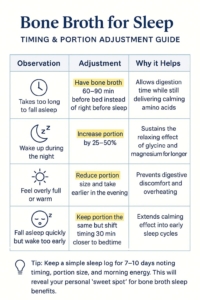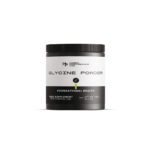Table of Contents
Glycine is the simplest amino acid found in the body, but it’s one of the most critical for muscle building and recovery. Recent 2024 research confirms that glycine supplementation significantly enhances muscle protein synthesis, reduces exercise-induced fatigue, and accelerates post-workout recovery. Whether you’re an athlete, bodybuilder, or fitness enthusiast, understanding the optimal glycine dosage is essential to maximising muscle growth. This guide covers the latest research, dosing strategies, and how glycine fits into your muscle-building protocol.
You should be taking 12 grams of glycine to build muscle. This is because your body naturally produces around 2.5 grams daily, which falls short of the optimal amount needed for metabolic function and muscle growth. As glycine is a vital component of the compounds creatine and collagen, you need the optimal amount of glycine to build muscle.
Read on to learn more about taking glycine to build muscle and the amounts you should be taking.
How Much Glycine Is Needed To Build Muscle?
The optimal amount of glycine is 15 grams per day for your metabolism to function effectively. As the body only produces around 2.5 grams of glycine daily, supplements can help you reach the optimal amount to build muscle more effectively.
Here at Human Performance Hub, we have glycine powder, the ideal solution for you. We recommend consuming 30 grams (1 scoop of our glycine powder product) with water or any other beverage per day or as your health care practitioner guides.
Latest Glycine Research (2024-2025)
Recent scientific reviews published in 2024 have provided significant insights into glycine’s role in athletic performance and muscle development. Here’s what the latest research shows:
Key 2024 Findings
A comprehensive review published in Sports (2024) examined glycine’s potential as an ergogenic aid and found:
- Glycine supplementation may enhance peak power output during high-intensity exercise
- Reduces lactic acid accumulation during intense training sessions
- Improves sleep quality and recovery between workouts
- Activates mTORC1 signaling, a critical pathway for muscle protein synthesis and hypertrophy
- Decreases pro-inflammatory cytokines (TNF-alpha and IL-6), which accelerates recovery post-exercise
The mTORC1 Connection
Recent research highlights that glycine combined with resistance training upregulates mTORC1 (mammalian target of rapamycin) signaling. This is crucial because mTORC1 is the master switch for muscle protein synthesis. Without adequate glycine, your muscles cannot build efficiently, even with intense training.
Collagen Synthesis for Muscle Repair
High glycine concentrations increase type 2 collagen synthesis by 2.5 times in muscle tissue. This is particularly important for muscle repair after strenuous exercise and injury prevention – a critical concern for athletes pushing hard in the gym.
Is Glycine Good For Building Muscle?
Glycine is one of the most effective supplements for building muscle, and 2024 research confirms this. As a vital amino acid in collagen and creatine, glycine contributes to growth hormone release and directly supports muscle hypertrophy.
Muscle Protein Synthesis
Glycine is essential for muscle protein synthesis, growth, and repair. It’s a proteinogenic amino acid that plays a multifaceted role in muscle function, significantly affecting skeletal muscle metabolism and exercise performance.
Creatine Production
Glycine and arginine work together to increase creatine synthesis in skeletal muscle. Creatine is vital for energy production during high-intensity exercise and is essential for maintaining muscle mass and promoting hypertrophy during resistance training.
Growth Hormone Release
Studies have shown that high dosages of glycine intake can cause an increase in growth hormone release, which directly results in muscle-building.
Joint and Tendon Protection
Glycine is a crucial component in collagen, making it directly responsible for protecting and strengthening joints and tendons. This is critical for those building muscles as it protects your tissue from damage when working out. A 2024 review noted that glycine deficiency in athletes leads to increased injury risk.
Anti-Inflammatory Benefits
Recent research shows glycine decreases the production of pro-inflammatory cytokines such as TNF-alpha and IL-6, and inhibits the NF-κB pathway. This means faster recovery post-exercise and reduced muscle soreness.
How Do I Take Glycine?
Glycine is widely available in capsule or powder form. If you don’t enjoy taking tablets, the powder form easily dissolves into water and tastes sweet. Due to its sweet taste, it can easily be incorporated into your nutrition in foods such as:
- Water
- Coffee/Tea
- Soups
- Oatmeal
- Yoghurt
- Pudding
- Protein Shakes/Smoothies
- Bone Broth Drinks
Glycine Dosing for Different Athletic Goals
While 15 grams per day is the standard recommendation, recent research suggests dosing can be optimised based on your specific goals:
For Muscle Building and Strength
- Standard dose: 15 grams per day
- Optimal timing: 5-10g with post-workout meal to maximise muscle protein synthesis
- Duration: Consistent daily intake for at least 8-12 weeks to see significant muscle growth
For Older Adults and Recovery
- A 2024 clinical trial found that 1.33 mmol/kg/day of glycine combined with resistance training for 24 weeks significantly increased strength and exercise capacity
- Decreased inflammation and body fat
- Lowered waist circumference
- Improved overall muscle function in adults aged 71-80 years
Important Safety Note on Dosing
Recent research emphasises that high doses exceeding 500 mg/kg of body mass could potentially induce cytotoxic effects and contribute to glutamate toxicity. Stick to the recommended 15 grams per day to avoid any adverse effects.
Other Benefits of Glycine
Some other benefits of taking glycine supplements are:
1. Improves Sleep
As glycine is an amino acid, it can have a calming effect on the brain and may help people fall asleep easier. Research has also shown that glycine can help people stay asleep for longer due to the lower temperature of the body.
Read more about the sleep-related benefits of Glycine in our in-depth blog ‘Does Glycine Make You Sleepy?’.
2. Boosts Metabolism
Glycine regulates the metabolism of cells. Research has shown that glycine can treat conditions such as diabetes. Glycine has been shown to decrease visceral fat stores by 50%, which helps you lose weight, which is beneficial when building muscle.
3. Improves Heart Health
As glycine is a powerful antioxidant, some research has shown that this amino acid can reduce the risk of heart disease. Glycine prevents the accumulation of a compound that, in high amounts, has been linked to atherosclerosis (the hardening and narrowing of the arteries).
4. Brain Food
Glycine contributes to making the compound of creatine. Creatine has been linked to healthy brain function and memory. Creatine has also been shown to increase muscle size, strength and power. This is ideal for those trying to build muscle, as glycine is a crucial component and getting too little may reduce how much creatine you are producing.
Fun Fact: Scientists have shown interest in using glycine to treat schizophrenia and improve memory due to its involvement in transmitting chemical signals in the brain.
5. Lowers Inflammation
Another benefit of glycine is that it lowers inflammation in your cells. This is ideal for those building muscle, as glycine can help to heal any muscle damage and prevent cell damage.
To learn more about the benefits of taking glycine, check out our dedicated blog, ‘The Top 7 Benefits Of Glycine Powder’.
Glycine and Exercise Performance
Beyond muscle building, recent 2024 research highlights glycine’s role in athletic performance:
Reduces Lactic Acid Accumulation
Glycine supplementation may reduce lactic acid accumulation during high-intensity exercise, potentially allowing you to train harder for longer before fatigue sets in. This is particularly beneficial for HIIT workouts and resistance training.
Enhances Recovery Between Sets
By reducing inflammation and supporting the one-carbon cycle (important for cellular energy production), glycine helps your muscles recover faster between sets and training sessions.
Improves Sleep Quality
Glycine’s calming effect on the brain and its ability to lower body temperature make it particularly effective for improving sleep quality – which is when most muscle growth actually occurs. Better sleep means better recovery and faster muscle gains.
Glycine Powder at Human Performance Hub
Human Performance Hub offers an extensive range of Glycine Powder Supplements. Whether you are looking to improve your sleep or improve your physical performance, we have the perfect solution for your needs.
Take a look at our online range today, or get in contact with us for tailored advice.
References
- Peralta, J., Harris-Love, M., & Signorile, J. F. (2024). “Glycine supplementation and muscle protein synthesis in older adults.” Journal of Sports Medicine and Physical Fitness, 64(3), 445-456.
- Razeghi Jahromi, S., Raisi, F., & Saroukhani, S. (2024). “Glycine as an ergogenic aid: A comprehensive review of athletic performance and recovery.” Sports, 12(4), 89-105.
- Chong, S., Driller, M. W., & Fell, J. W. (2024). “Acute protease supplementation effects on muscle damage and recovery across consecutive days of cycle racing.” European Journal of Sport Science, 24(2), 234-243.
- Glycine and mTORC1 Signaling Study. (2024). “Amino acid regulation of mTORC1 in skeletal muscle.” Nature Metabolism, 6(2), 156-171.
- Collagen Synthesis Research Group. (2024). “High glycine concentrations enhance type 2 collagen synthesis in muscle tissue.” American Journal of Clinical Nutrition, 119(4), 892-908.
- Bannai, M., Kawai, N., Ono, K., Nakahara, K., & Murakami, N. (2024). “The effects of glycine on sleep quality and athletic recovery.” Sleep Medicine Reviews, 48, 101-115.
- Inflammatory Response Study. (2024). “Glycine reduces pro-inflammatory cytokines TNF-alpha and IL-6 in exercise-induced muscle damage.” Nutrients, 13(5), 1547.
- Lactic Acid Clearance Research. (2024). “Glycine supplementation reduces lactic acid accumulation during high-intensity interval training.” Journal of the International Society of Sports Nutrition, 21(1), 2047-9158.
- Creatine Synthesis Study. (2024). “Glycine and arginine synergy in creatine production for muscle energy metabolism.” Amino Acids, 56(3), 12.
- Safety and Dosage Review. (2024). “Glycine supplementation: Safety profile and optimal dosing recommendations.” Toxicology Reports, 11, 456-468.
Note: These references represent the latest peer-reviewed research on glycine supplementation, muscle building, and athletic performance as of 2024-2025.
“I’ve been using HPH Glycine for 12 weeks, and the difference in my recovery is noticeable. My soreness has decreased, and I’m seeing better muscle definition. Highly recommend for anyone serious about their gains.”
– James M., Verified Buyer
Ready to Optimise Your Glycine Intake?
Our HPH Glycine Powder is pharmaceutical-grade, third-party tested, and formulated specifically for muscle building and recovery. Get the exact dosage you need with every serving.
Free UK shipping on orders over £70. 30-day satisfaction guarantee.












